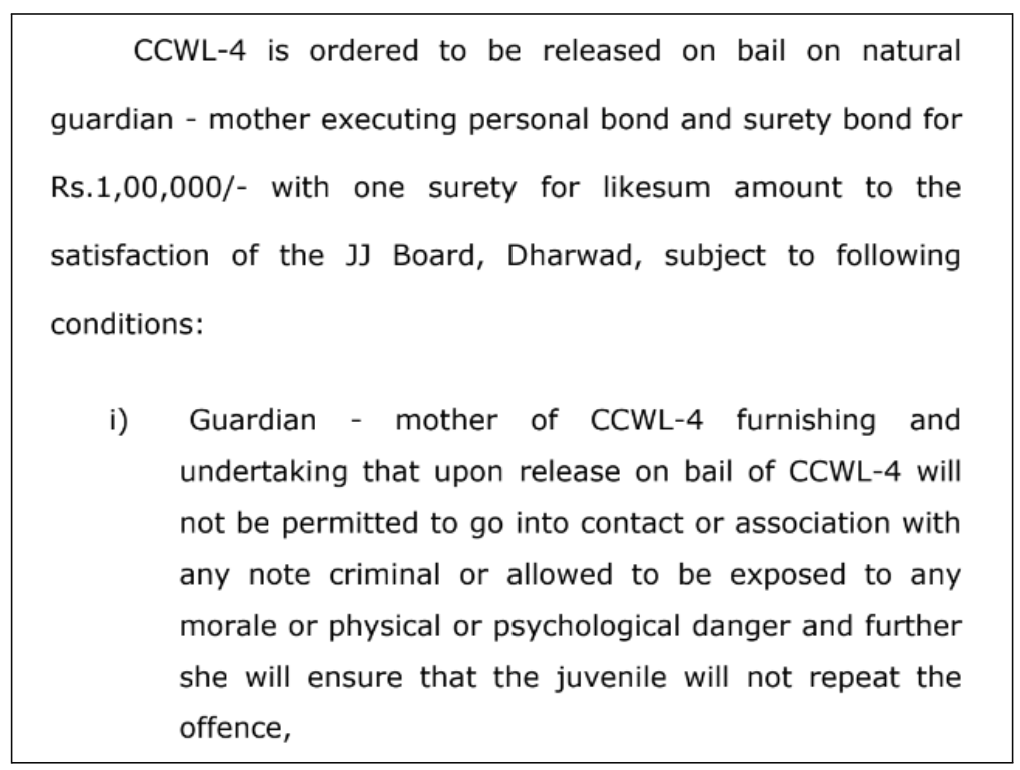In this edition of the court judgements review, we look at the Supreme Court’s judgement that compliance with Section 52 of the NDPS Act is mandatory for disposing seized narcotic substances, that petition to quash proceedings is not required when deciding a bail application, Delhi HC’s ruling that a merit list cannot stay alive for an indefinite period for enforcement, that denial of a passport can seriously impede the rights of a citizen, among others.
SC: Compliance with Section 52 of the NDPS Act is mandatory for disposing seized narcotic substances
In Mangilal vs. State of Madhya Pradesh, the appellant was sentenced to rigorous imprisonment for 10 years by an Additional Sessions Judge in Madhya Pradesh, which was later confirmed by the High Court as well. The prosecution’s case was based on information received by the Assistant Sub Inspector, H.S. Sengar, stating that the appellant and a co-accused were involved in supplying narcotic substances. Police stopped a tractor and seized bags containing the contraband. FIR was filed under Section 8(b) read with Section 15(c), Sections 25 and 29 of the Narcotic Drugs and Psychotropic Substances Act. However, during the trial, out of 16 witnesses, four witnesses turned hostile. The Supreme Court noted that two of the witnesses bearing testimony to the arrest memo were not examined and this was not considered by the courts.
The main issue in the case considered by the Supreme Court was compliance with Section 52 of the NDPS Act which deals with the disposal of seized narcotic drugs and psychotropic substances. The bench of Justices A S Bopanna and M M Sundresh observed that there was serious doubt with respect to the seizure as one of the witnesses, a police offer, had testified that the seized materials already existed before the occurrence of the seizure. Further, the court noted that the procedures prescribed under Section 52 of the Act were not followed and the seized material was not produced by the police. As per the provision, an inventory of such narcotic drugs should be prepared, Magistrate concerned should certify the correctness of the inventory along with relevant photographs.
Further, it noted that there was no order passed by the magistrate for the disposal of the narcotics substance allegedly seized. Observing such discrepancies, the Court acquitted the appellant. The Bench added that the Court should be satisfied with compliance while deciding such a case. Moreover, the onus is entirely on the prosecution in such a case to satisfy the Court when such an issue arises for consideration. Further, as per Section 114(g) of the Indian Evidence Act, non-production of physical evidence would lead to a negative inference.
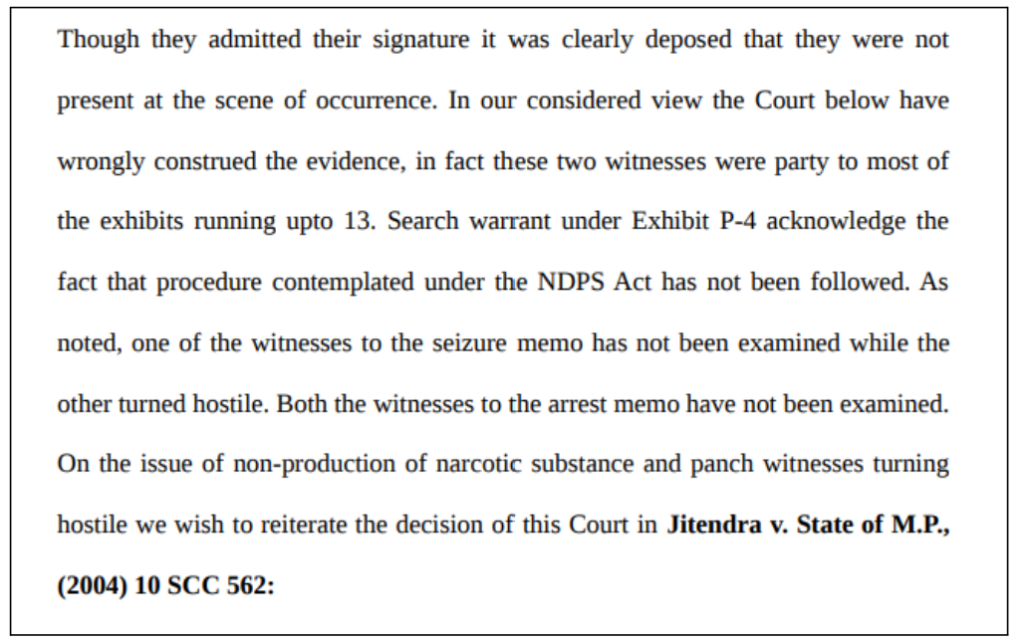
SC: Petition to quash proceedings is not required when deciding a bail application
In the case, Teesta Atul Setalvad vs. State of Gujarat, the appellant had challenged the Gujarat High Court’s order denying her bail, before the Supreme Court. The appellant was arrested soon after the case, Zakia Ahsan Jafri vs. State of Gujarat and another was decided and an FIR came to be registered for offences punishable under Sections 468, 469, 471, 194, 211, 218 and 120B of the IPC. Her bail application was rejected both by the Sessions Judge and the High Court Bench. It was contended that only 2 of the offences against the appellant were non-bailable. While denying the bail, the High Court observed that the appellant had not challenged the FIR or chargesheet against her under Section 482 Cr.PC or under Article 226 or Article 32 of the Constitution, it is not permissible for her to say that a prima facie case is not made out.
The Supreme Court Bench of Justices BR Gavai, AS Bopanna and Dipankar Datta stated that the factors to be taken into consideration at the stage of grant of bail are – (i) prima facie case, (ii) the possibility of the accused tampering with the evidence or influencing the witnesses, and (iii) the possibility of the accused fleeing away from the hands of justice along with the gravity of the offence. It observed that, if the observations of the High Court judge are to be accepted, then no application for bail can be accepted unless the accused files an application for quashing the proceedings. The Bench quashed the High Court’s order and granted bail to the appellant under the condition that she should not attempt to influence or intimidate the witnesses.
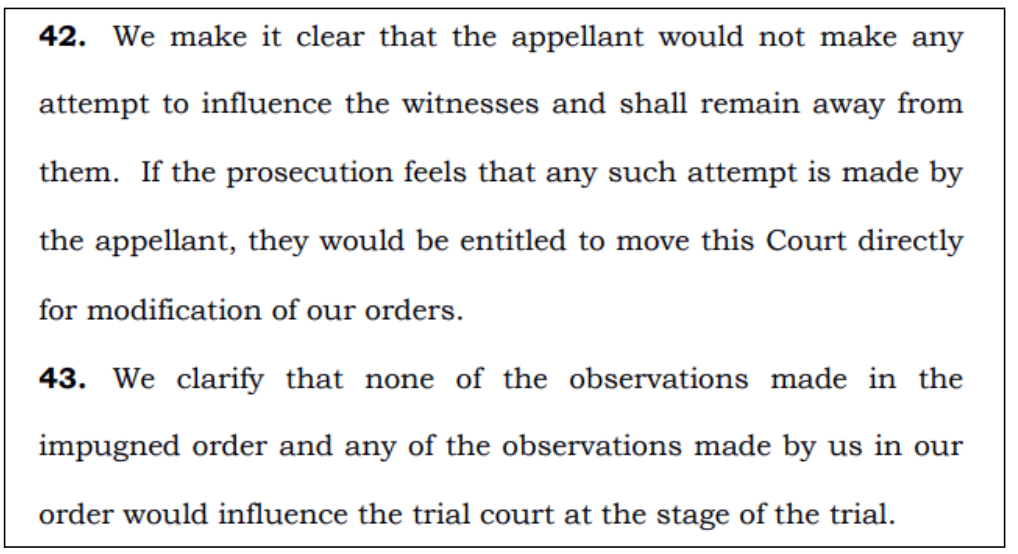
Delhi HC: A merit list cannot stay alive for an indefinite period for enforcement
A woman sought appointment as Trained Graduate Teacher (TGT) of mathematics in a school in Delhi on the ground that being the 3rd rank holder in the merit list published in 2017, she should be given the post after the first rank holder was disqualified and the second candidate showed no interest in the job. In this case, Rupinderjit Kaur vs. The Manager of Dhanpatmal Virmani Senior Secondary School & Others, the matter before the Delhi High Court was whether the merit list of 2017, entitles the petitioner any legal right to get appointed at the concerned post and if the merit list prepared in the year 2017 could survive for an indefinite period.
Referring to past cases, Justice Chandra Dhari Singh observed that more than 5 years have elapsed since the merit list was published and that it was highly improper for the Court to review the list. He added that there must be a certain reasonable duration during which the merit list can be considered by the Court to grant any relief. Dismissing the appeal, he concluded that a merit list only enlists the selected candidates but does not confer any right for appointment upon the selected candidates and that the merit list cannot stay alive for an indefinite period for enforcement.
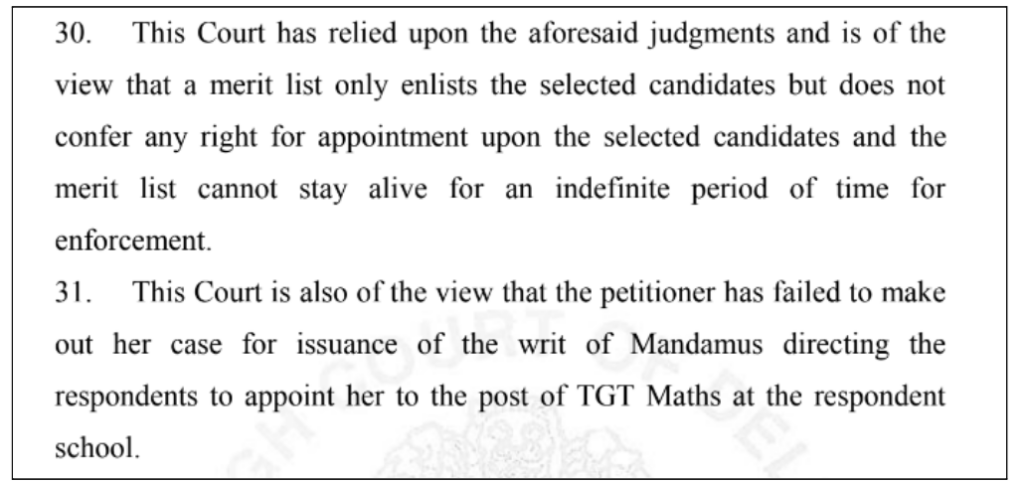
Delhi HC: Denial of passport can seriously impede the rights of a citizen
The petitioner in Nishant Singhal vs. Union of India & Others was a minor when his parents got him a passport issued with his ‘Date of Birth’ shown as 16 January 2003 on the basis of the initial birth certificate and that after realizing their mistake, they got his date of birth changed to 16 July 2003 by issuing him a new birth certificate in 2007. Meanwhile, the passport was renewed twice when he was a minor in 2010 and 2014. Later, in 2019, the petitioner applied to the office of Regional Passport Office, Ghaziabad, U.P. for renewal of his passport by endorsing his correct date of birth by submitting the relevant proofs such as Senior School Certificate, Aadhaar Card, certificate of cancellation of old Birth Certificate and valid new Birth Certificate.
However, his application was declined stating that his birth certificate used to obtain the previous passport was issued even before the new date of birth claimed by the applicant. His claim for correction/change in the date of birth was considered not genuine/bonafide. Justice Subramonium Prasad held that an application for renewal of the passport of an individual cannot be denied only on the basis of apprehension that the earlier passports would have been misused. Denying a passport can seriously impede the rights of a citizen. Taking note of the Office Memorandum issued by the Union Ministry of External Affairs in 2015, laying down the procedure for change or correction of dates of birth entries in a passport of an applicant already held by him or her, the Delhi High Court directed the Government to issue a fresh passport to Singhal with the correct Date of Birth.
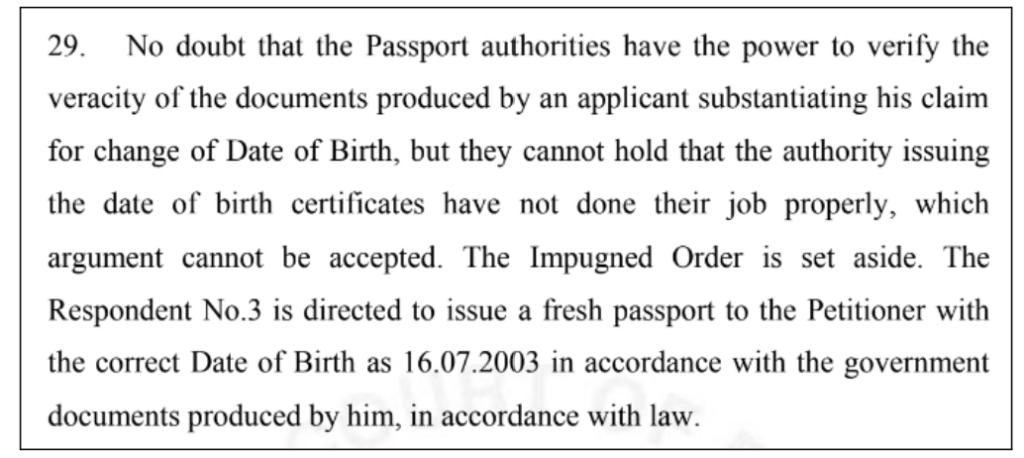
Karnataka HC: Mother is fit to be custodian of a minor accused of raping minor girl
In (Minor) vs. State of Karnataka, a case was registered against the petitioner’s son for the offences punishable under Sections 354, 354(D), 363, 366(A), 376D read with 34 IPC, Sections 4, 6, 8 and 14 of the POCSO Act, 2012. He was a minor and had assaulted and raped a minor girl along with many others on two occasions and had video graphed the same and threatened her not to tell anyone. While the mother sought bail for her son, the state argued that the minor had committed a grievous offence and was not entitled to bail. According to the petitioner’s contentions, the consideration of regular bail under Section 439 of Cr.P.C. and the bail application under Section 12 of the Juvenile Justice (Care and Protection of Children) Act, 2015 was different. The nature and gravity of the offence is not a matter required to be considered while deciding the application filed under Section 12 of the JJ Act.
In this case, Karnataka High Court noted that JJ Board called for a report about the mental condition of the juvenile from the Dharwad Institute of Mental Health and Neurosciences (DIMHANS) while in terms of Rule 10, the Social Investigation Report has to be secured in Form No.6 from Probation Officer/ Voluntary/Non-governmental Organization. If considered, the report would not meet the triple test envisaged under Section 12 (1) of the JJ Act to deny bail to a juvenile. As per the report, neglect by family & poor supervision was why he committed the crime. Further, the accused minor’s father had died by suicide and he had poor family connections. It noted that he was influenced by peers while lacking an understanding of the consequences of the crime. It recommended family counselling and individual therapy – lifestyle modification/life skills training.
A single bench of Justice Anil B Katti observed that the welfare and well-being of the juvenile, in this case, can be taken care of by his mother and she is a fit and proper person to keep him in custody and granted bail to him allowing the petition. The court ordered her to ensure that he pursues his studies and does productive activities and not be allowed to waste his time in unproductive activities. Further, it directed the probation officer to keep an eye on the juvenile’s activities.
